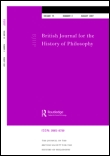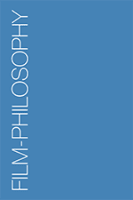
STUDIES IN EAST EUROPEAN THOUGHT
Scope & Guideline
Navigating the Intricacies of Eastern Europe's Intellectual Landscape
Introduction
Aims and Scopes
- Exploration of Russian Philosophy:
The journal consistently delves into the works and influences of notable Russian philosophers, such as Evald Ilyenkov, Nikolai Berdyaev, and Semyon Frank, examining their contributions to both Eastern and Western philosophical traditions. - Interdisciplinary Approaches:
Emphasizing a blend of philosophy, theology, literature, and history, the journal encourages interdisciplinary research that situates philosophical inquiry within broader cultural and social contexts. - Critical Analysis of Contemporary Issues:
The journal addresses contemporary philosophical issues, including ethics, politics, and the implications of modernity, particularly in the context of Eastern Europe’s sociopolitical landscape. - Historical Contextualization:
A significant focus is placed on the historical development of ideas within Eastern European thought, tracing influences from earlier philosophical traditions to modern interpretations and applications. - Engagement with Global Philosophical Discourse:
The journal seeks to connect Eastern European philosophical debates with global discussions, highlighting the relevance of regional thought in a wider philosophical context.
Trending and Emerging
- Intersections of Philosophy and Politics:
There is a growing emphasis on the relationship between philosophical discourse and political issues, particularly in light of recent geopolitical events in Eastern Europe, such as the war in Ukraine. - Post-Soviet Philosophical Reflections:
Emerging themes focus on post-Soviet identity and the philosophical implications of the transition from Soviet ideology to contemporary thought, highlighting the quest for a new philosophical identity. - The Role of Literature in Philosophy:
An increasing number of papers explore the interplay between literature and philosophy, particularly how literary works reflect and influence philosophical ideas in the Eastern European context. - Environmental and Ethical Philosophy:
There is a noticeable trend towards discussions around environmental ethics and the philosophical implications of ecological crises, linking Eastern European thought with global environmental concerns. - Globalization and Cultural Exchange:
The journal is increasingly addressing themes related to globalization, cultural exchange, and the impact of these phenomena on Eastern European philosophical traditions, reflecting a broader engagement with international discourse.
Declining or Waning
- Marxist Thought:
Papers exploring Marxism, particularly in the context of Eastern European history, have seen a reduction. This may be due to the evolving political landscape and a shift towards more diverse philosophical frameworks. - Traditional Religious Philosophy:
Discussions centered on traditional religious philosophy, particularly Orthodox Christianity, seem to be waning as the journal increasingly embraces more secular and contemporary philosophical themes. - Historical Narratives of Eastern European Thought:
There is a noticeable decline in papers that strictly adhere to historical narratives of Eastern European philosophy, with a growing preference for contemporary applications and critiques. - Focus on Lesser-Known Philosophers:
The exploration of lesser-known Eastern European philosophers has decreased, possibly as the journal prioritizes more influential figures whose works resonate with current philosophical discussions.
Similar Journals

British Journal for the History of Philosophy
Advancing Critical Insights into Philosophical TraditionsThe British Journal for the History of Philosophy, published by ROUTLEDGE JOURNALS, TAYLOR & FRANCIS LTD, is a leading academic journal dedicated to the exploration and critical examination of historical philosophies and their implications. Founded in 1993 and operating through 2024, this quarterly publication holds a prestigious status, being ranked Q1 in Philosophy with a Scopus rank of 188 out of 806, placing it in the 76th percentile within the arts and humanities domain. The journal is unique in its commitment to showcasing interdisciplinary research, catering to scholars, professionals, and students interested in philosophical history's complexities and developments. Although it does not currently offer Open Access options, it remains an essential resource for contemporary debates and historical insights in philosophy, contributing to the wider academic discourse on ethical, epistemological, and metaphysical inquiries.

HISTORY OF POLITICAL THOUGHT
Illuminating the Intersection of History and PoliticsHISTORY OF POLITICAL THOUGHT is a distinguished academic journal published by Imprint Academic, dedicated to advancing scholarship in the realms of history, political science, and philosophy. Holding an impressive Q2 ranking in History and notable presence in Philosophy, as well as Sociology and Political Science among its quartile categories, the journal provides a prominent platform for critical essays, reviews, and research articles that delve into the evolution and impact of political ideas throughout history. With an ISSN of 0143-781X and an E-ISSN of 2051-2988, it caters to a wide array of scholars, policymakers, and students keen on understanding the intricate interplay of political thought across diverse contexts. The journal does not currently offer Open Access, ensuring curated content targeted towards an informed audience. HISTORY OF POLITICAL THOUGHT aims to foster intellectual discourse and encourage rigorous analysis, making it a vital resource for those who seek to comprehend and critique the foundational ideas that shape our political landscape.

Anales del Seminario de Historia de la Filosofia
Fostering Global Conversations in Historical PhilosophyAnales del Seminario de Historia de la Filosofia, published by UNIV COMPLUTENSE MADRID, SERVICIO PUBLICACIONES, is a distinguished open-access journal that has been contributing to the fields of History and Philosophy since 1980. With an ISSN of 0211-2337 and E-ISSN 1988-2564, it aims to provide a scholarly platform for the dissemination of original research and critical reviews pertinent to the historiography of philosophy and its influences on modern thought. The journal features a robust open-access model, ensuring that all published content is readily available to researchers, students, and professionals worldwide. The journal currently enjoys recognition within its field, classified within the Q3 quartile in History and Philosophy of Science and Q2 quartile in Philosophy as of 2023. Positioned within the heart of Spain, the journal facilitates international academic dialogue and invites submissions that explore the intersection of past philosophical contexts and contemporary issues. Whether you are a seasoned scholar or a budding philosopher, Anales del Seminario de Historia de la Filosofia aims to foster a deeper understanding of philosophical traditions and their ongoing relevance in today’s discourse.

Ingenium-Revista Electronica de Pensamiento Moderno y Metodologia en Historia de la Ideas
Fostering Interdisciplinary Insights in Ideas.Ingenium - Revista Electronica de Pensamiento Moderno y Metodologia en Historia de la Ideas is a pivotal academic journal dedicated to the exploration and analysis of modern thought and methodological frameworks in the history of ideas. Published by the esteemed Universidad Complutense de Madrid, this journal serves as a vital platform for scholars interested in interdisciplinary studies that merge philosophy, history, and social sciences. With an ISSN of 1989-3663, Ingenium stands at the forefront of academic discourse, encouraging the dissemination of knowledge without barriers through its Open Access principles. By fostering a rigorous academic environment, Ingenium aims to enrich the scholarly community's understanding of the evolution of ideas and their impact on contemporary thought. As such, it is an essential resource for researchers, professionals, and students striving to navigate the complexities of modern intellectual landscapes.

Konstantinove Listy-Constantines Letters
Connecting the past with contemporary scholarship.Konstantinove Listy - Constantines Letters is a premier academic journal published by the Constantine Philosopher University in Nitra, Slovakia. With a focus on the interdisciplinary exploration of historical, philosophical, and religious studies, this journal has established itself as a significant platform for scholarly discourse since its inception in 2015. The journal's impressive rankings—Q1 in History and Religious Studies, along with Q2 in Philosophy—demonstrate its commitment to high-quality research, concurrent with its strong performance in Scopus rankings, placing it in the 80th percentile for both Religious Studies and History disciplines. As an integral part of the academic landscape, Konstantinove Listy invites researchers, professionals, and students alike to contribute to its mission of advancing knowledge and understanding in these vital fields. While the journal operates under traditional publishing, it is recognized for its accessibility and contribution to fostering a vibrant scholarly community.

Revue de Synthese
Illuminating Contemporary Philosophical ChallengesRevue de Synthèse, published by BRILL, is a distinguished journal in the field of Philosophy, recognized for its rich academic tradition since its inception in 1950. With an impressive history of converged years and a steady commitment to philosophical discourse, the journal offers a platform for scholars to present innovative ideas and critical analyses. Although currently listed in Q4 of the 2023 category quartiles, it serves as an essential resource for those pursuing interdisciplinary studies, enriching the philosophical landscape amidst global intellectual challenges. The journal is not currently available as Open Access, making its curated content accessible through institutional subscriptions. With an ISSN of 0035-1776 and E-ISSN of 1955-2343, Revue de Synthèse aims to empower researchers, professionals, and students alike with transformative insights that advance the understanding of contemporary philosophical issues.

REVUE PHILOSOPHIQUE DE LA FRANCE ET DE L ETRANGER
Cultivating Insightful Philosophical PerspectivesREVUE PHILOSOPHIQUE DE LA FRANCE ET DE L'ETRANGER is a distinguished academic journal published by PRESSES UNIV FRANCE, focusing primarily on the field of philosophy. Established in 1949 and continuing its legacy into 2023, this journal serves as a vital platform for scholarly dialogue and exploration of philosophical ideas that transcend national boundaries. While it currently holds a Q4 ranking in the philosophy category according to the latest Scopus assessments, its contributions remain significant in fostering a comprehensive understanding of various philosophical discourses. Based in France, at 6 AVENUE REILLE, 75685 PARIS CEDEX 14, this journal provides an essential resource for researchers, professionals, and students alike, despite not being an open-access publication. Each issue encourages a deeper engagement with contemporary philosophical thought while contributing to the academic community's ongoing discussions on fundamental philosophical questions.

VOPROSY FILOSOFII
Cultivating Ideas that Shape Contemporary ThoughtVoprosy Filosofii, published by the prestigious Russian Academy of Sciences - Institute of Philosophy, is a leading journal in the fields of Philosophy, Cultural Studies, and History and Philosophy of Science, boasting an impressive standing in its category with a Q2 rank across various disciplines as of 2023. This journal serves as a crucial platform for the exchange of innovative ideas and scholarly research, addressing key philosophical inquiries and cultural narratives that shape contemporary thought. Despite its lack of Open Access options, the journal's commitment to rigorous academic standards ensures that it remains a vital resource for researchers, professionals, and students seeking to engage with critical philosophical dialogue. With a history of publication reaching back to 2002 and a diverse scope covering linguistics, philosophy, and social sciences, Voprosy Filosofii continues to foster intellectual exploration from its base in Moscow, Russia.

Hybris-Revista de Filosofia
Fostering Global Perspectives on Contemporary PhilosophyHybris-Revista de Filosofia, published by the CENTRO ALTOS ESTUDIOS FILOSOFICOS & CIENCIAS SOCIALES-CENALTES in Santiago, Chile, is a premier open-access journal dedicated to the exploration and advancement of philosophical thought and interdisciplinary dialogue. Established in 2009, the journal provides a vibrant platform for original research articles, critiques, and essays that delve into various philosophical paradigms, encouraging contributions from scholars across the globe. As an open-access journal, Hybris ensures that its scholarly content is freely accessible, promoting the dissemination of knowledge and fostering collaboration among researchers, professionals, and students alike. With an emphasis on innovative ideas and diverse perspectives in philosophy, Hybris plays a pivotal role in shaping contemporary discourse and is an essential resource for anyone interested in the evolving landscape of philosophical inquiry.

Film-Philosophy
Unveiling the Aesthetics of Cinema and PhilosophyFilm-Philosophy is an esteemed academic journal published by Edinburgh University Press, specializing in the intersection of film studies and philosophical discourse. Since its launch in 1998, this Open Access journal has provided a platform for scholarly debates and innovative research, allowing for free and unrestricted access to its content, which has significantly contributed to the global dialogue on visual culture. With a commendable impact illustrated by its Q1 ranking in Visual Arts and Performing Arts and Q2 in Philosophy, the journal sits within the top quartile of its field. Operating from the United Kingdom, Film-Philosophy is committed to fostering a multidisciplinary approach, inviting contributions from researchers, professionals, and students alike. By engaging with critical theories and the aesthetics of cinema, the journal stands as a vital resource for understanding the philosophical implications of film and its cultural significance.